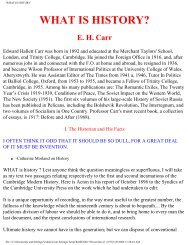The bronze age and the Celtic world - Universal History Library
The bronze age and the Celtic world - Universal History Library
The bronze age and the Celtic world - Universal History Library
You also want an ePaper? Increase the reach of your titles
YUMPU automatically turns print PDFs into web optimized ePapers that Google loves.
GREEK LANDS AND THE BASIS OF CHRONOLOGY 105<br />
elements of culture, which can best be matched in <strong>the</strong> Danube basin. <strong>The</strong>se, according<br />
to <strong>the</strong> traditions preserved in <strong>the</strong> Iliad, were <strong>the</strong> immediate ancestors of <strong>the</strong> heroes<br />
of <strong>the</strong> Trojan War. Recently Dr. Wace,^ who has made a careful study of <strong>the</strong><br />
pre-Hellenic remains of <strong>the</strong> mainl<strong>and</strong> of Greece, especially of <strong>the</strong> pottery, has pointed<br />
out that <strong>the</strong>re is but one break in <strong>the</strong> ceramic evolution of that region, <strong>the</strong> introduction<br />
of geometric ware. This is, he believes, best explained by equating it with <strong>the</strong> Dorian<br />
invasion, which took place some generations after <strong>the</strong> siege of Troy. Dr. Wace has<br />
certainly made out a strong case, <strong>and</strong> we must accept his view that no invasion, in <strong>the</strong><br />
strict sense of <strong>the</strong> term, preceded that of <strong>the</strong> Dorians ; but while he would have us<br />
scrap <strong>the</strong> " Achsean " hypo<strong>the</strong>sis in its entirety, we must, I think, consider awhile<br />
before dismissing aU <strong>the</strong> evidence that Sir William Ridgeway has accumulated.<br />
Much of Ridgeway' s archaeological evidence is Hallstatt in type <strong>and</strong>, apparently<br />
at least, Hallstatt in date, <strong>and</strong> may well equate better with <strong>the</strong> Dorian than <strong>the</strong><br />
" Achsean " movement, but <strong>the</strong> legends are not to be hghtly swept aside, <strong>and</strong> we have<br />
<strong>the</strong> swords, which are admittedly pre-geometric, <strong>and</strong> so pre-Dorian, <strong>and</strong> may well<br />
antedate also <strong>the</strong> Trojan War. <strong>The</strong>re is also <strong>the</strong> introduction into sou<strong>the</strong>rn Greece of a<br />
type of palace, which seems to have developed in a more nor<strong>the</strong>rly clime.* We have,<br />
<strong>the</strong>refore, evidence for some intrusive elements entering Greek l<strong>and</strong>s from <strong>the</strong> Danube<br />
basin, bringing with <strong>the</strong>m swords of Central European type, a new type of domestic<br />
architecture, <strong>and</strong>, we may well beheve, certain deities <strong>and</strong> beliefs of more nor<strong>the</strong>rn<br />
origin,' yet <strong>the</strong> continuity of <strong>the</strong> ceramic culture shows that <strong>the</strong>re had been no general<br />
displacement of <strong>the</strong> population.<br />
Before attempting to decide between <strong>the</strong>se conflicting views, it may be wise to<br />
consider <strong>the</strong> term " Achsean." By this I mean only those people, who are <strong>the</strong> subject<br />
of Sir William Ridgeway's hypo<strong>the</strong>sis, <strong>and</strong> who organised <strong>the</strong> attack upon Priam's<br />
Troy. <strong>The</strong>y may, for all we know, be a people or merely a class, <strong>and</strong> <strong>the</strong>ir connection<br />
with <strong>the</strong> Achseans of <strong>the</strong> Peloponnese, discussed by Herodotus,* may be very remote.<br />
It seems clear, in fact, that <strong>the</strong> term as used by Herodotus connoted something very<br />
different from what <strong>the</strong> term meant to Homer, <strong>and</strong> what it signifies in <strong>the</strong> p<strong>age</strong>s of<br />
Ridgeway.<br />
3 Wace (1916) 29, 30; (1920) 398. 5 Harrison (1908) 3i2n, 318, 319 ; Hall (1913) 520 fn.<br />
4 Hall (1913) 63 ; Mackenzie {1908-8). « Herodotus viii. 73.







